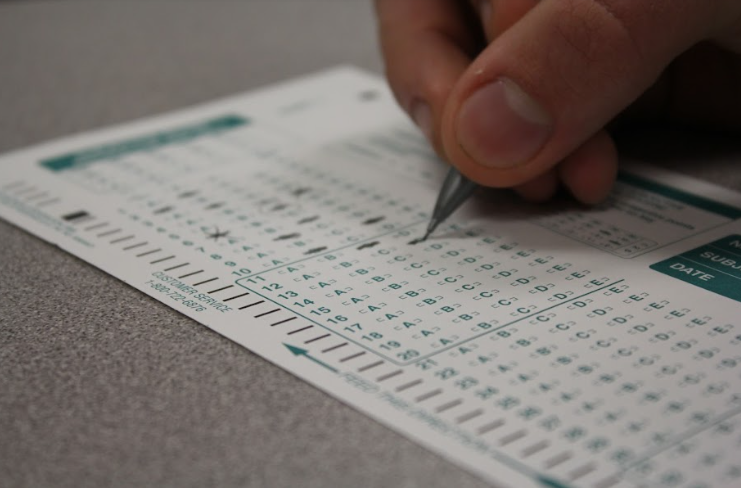School Districts Struggle to Adapt to Post-Break Finals
Media by Emma Tyulyayev
Missouri districts, students and staff have had to adapt to finals being pushed after winter break because of legislation that dictates when schools start for the year.
Bruno Bergoudian, senior, went to Brazil when Winter Break started, and was out of town until Jan. 15, meaning he missed the week before finals took place and the entirety of finals week.
“I got kind of lucky,” Bergoudian said. “Most of my classes don’t have a final test. It’s mostly just projects.”
He said that while he was in Brazil, he had to email teachers to stay on top of his big projects, so as not to get way behind.
Bergoudian said he would rather the semester ended before break and finals along with it because it would be so much easier to plan in advance.
“I go out of town every single year and miss a ton of school because I have to visit my family,” Bergoudian said, “It’s kind of a pain in the butt to have to talk to every single teacher, get everything I need and do stuff on my vacation for a class that I think should have ended before break.”
He said many students also tend to disengage from school over the holidays.
“It should be a time to rest your mind a little bit, have a break. But instead it feels like an extended weekend,” Bergoudian said.
Jessica Kellerman, senior, is taking four classes that give finals, including high intensity classes like AP Physics 1 and AP Calc AB.
“I can’t enjoy my winter break because I have to study,” Kellerman said.
Glenn Hancock, director of Research, Evaluation and Assessment, said the switch from pre break to post break finals occurred because of legislation that was passed in 2019
The legislation was signed by Governor Mike Parson in 2019, and it pushed back the earliest possible start date of schools by 4 days to benefit the tourism agency, and bound schools to this start date when they could previously apply for an exception.
The school calendar is reviewed by a committee every year to decide how the year will be arranged.
Hancock said RSD has tried to keep both semesters fairly similar in length which has caused finals to land after break.
“The committee that has parents, teachers, principals, they take feedback from everyone in the community and put together a proposed calendar,” Hancock said. “They share that proposed calendar for feedback, and then it gets presented to the board.”
A lot of people enjoyed the natural conclusion to the first semester winter break previously provided, Hancock said.
“If there was ever an opportunity to finish the year or the semester before we go on winter break I think that would be appreciated,” Hancock said.
Lindbergh High School has managed to fit finals in before break despite the new legislation pushing back the school year, Dr. Eric Cochran, principal of Lindbergh High School said. Their new system resulted in asymmetrical semesters with unequal lengths.
“We try to cram as many days into the first semester to make it a legitimate first semester,” Dr. Cochran said. “We don’t have a whole lot of days off for students, outside of the major holidays and one or two professional learning days for teachers.”
This creates a different experience for single semester courses, as the first semester has fewer learning days than the second semester, Dr. Cochran said.
Dr. Cochran said Lindberg used a post-break finals system like RSD does now when he had started teaching.
“We really felt that at the high school, that finishing those finals and using a college-like schedule where those finals are done for the break was worth trying to preserve,” Dr. Cochran said. “For our students, we thought that was better for kids.”
Dr. Cochran said there is something better about a “clean break” so students do not have to take a two-week break, come back and take finals soon after, and teachers also like to start fresh after a break.
Many students have also told him they are appreciative of finals before break.
The schedule Lindberg follows also works well later in the year during AP exams, as scores were high in the district last year, Dr. Cochran said, but the legislation still creates a suboptimal academic situation.
“There is no question that this legislation in my opinion hurts AP because it forces you to start your school year later but the AP test doesn’t change because that’s a nationally normed date that we have no choice over,” Dr. Cochran said. “It creates more of a sprint for students and for teachers to try to make sure they get through the course material in time.”
Dr. Cochran said that it is more difficult for the school to make breaks and breathers for students and teachers during the year.
“I think that that is not great for the mental health of our kids,” Dr. Cochran said. “If I had my choice, I would go back and remove that legislation. I think it’s bad for students.”
Additional Reporting by Zoya Shah
Your donation will support the student journalists of Marquette High School. Your contribution will allow us to purchase equipment and cover our annual website hosting costs. You may become a PATRON by making a donation at one of these levels: White/$30, Green/$50, Blue/$100. Patron names will be published in the print newsmagazine, on the website and once per quarter on our social media accounts.

Willem Hummel, Senior is a News Editor for the Marquette Messenger. This is his third year on staff, he has been involved in the Track Team, and Cross...

Emma Tyulyayev is an Illustrator for the Marquette Messenger. This is her second year on staff. After school, she enjoys driving around and going on frequent...







